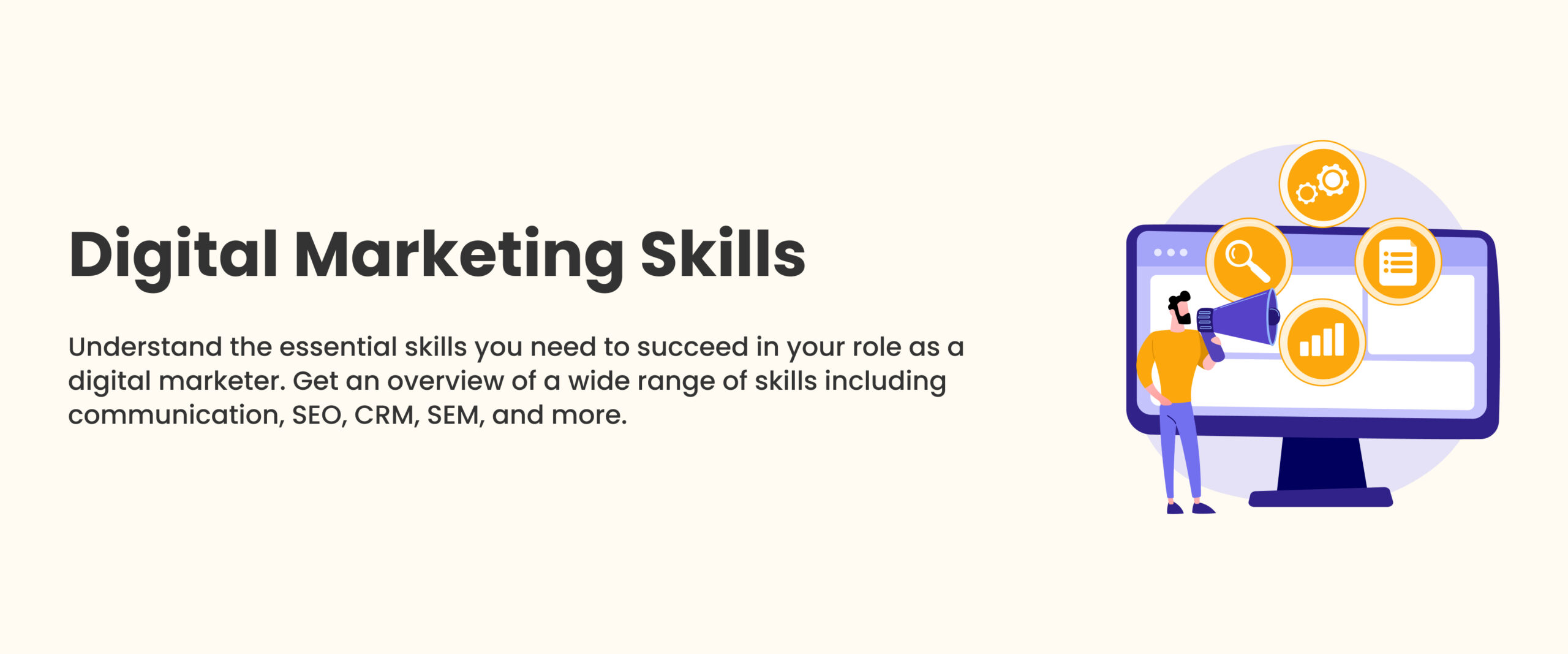Top 13 Digital Marketing Skills
In today’s highly competitive business landscape, digital marketing has emerged as a powerful tool. With the unstoppable growth and relevance of the internet and the rise of online marketplaces, businesses rely on digital marketing to reach their target customers and stay ahead of competitors.
Although traditional marketing strategies are still effective (in some cases), digital marketing expertise is essential for maintaining competitiveness and boosting business expansion. This blog will discuss the top digital marketing skills required for every marketer to succeed in the marketing field.
Digital Marketing: A Brief Overview
Digital marketing is a promotional approach that employs various digital technologies like the internet, mobile phones, and other digital media to advertise products and services. This method involves the use of digital channels, such as websites, social media, search engines, and email, as well as digital strategies like content marketing, influencer marketing, and search engine optimization (SEO).
The job opportunities in digital marketing span across various skill sets and domains. A digital marketer’s core specialization can be graphic or UX design, SEO, content creation, social media management, etc. Consider taking an online digital marketing course with placement to ace your skills in this field and become a creative digital marketing professional.
Important Digital Marketing Skills
Being a digital marketer requires you to come up with impactful marketing ideas. At the same time, a digital marketer must also be comfortably proficient in analyzing numbers to perform market research. Here are the top skills required for digital marketing.
1. Communication Skills
Both verbal and written communication skills are a must-have for anyone who wants to follow a digital marketing roadmap. A marketer communicates with their audience, including customers, clients, and stakeholders, through various online and offline channels.
A successful digital marketing strategy relies on the marketer’s ability to communicate effectively with their target audience through impactful messages, calls, emails, or other engagement mediums.
Here are some tips that can help you develop strong communication skills.
- Practice public speaking with your peers and customers.
- Work on improving your writing and editing skills.
- Familiarize yourself with different communication channels, such as email, messaging apps, and social media.
- Develop the ability to actively listen to customers, clients, and stakeholders.
- Pay attention to non-verbal cues, such as body language and facial expressions.
- Be aware of the context in which you’re communicating.
You should know what is business communication and why it is important.
2. Creative Thinking
Another essential but intangible digital marketing skill is the ability to think creatively. A digital marketer must think outside the box to come up with marketing messages and ideas that can capture the audience’s attention. Accordingly, plan and execute successful marketing campaigns.
Here are some tips to help you develop your creative thinking skills for a digital marketing job.
- Do research into the industry, your target audience, and other relevant topics.
- Collaborate with team members to brainstorm, exchange ideas, and discuss problem-solving approaches.
- Seek inspiration from successful digital marketing campaigns and learn from their lessons to improve your campaigns.
- Keep up with new trends in technology and digital marketing tools to stay ahead of the competition.
3. Email Marketing
Email marketing is a vital component of a digital marketing strategy, helping increase brand awareness and customer engagement. It can be used for advertising, sending commercial messages, sales solicitation, and promoting offers. Various types of email marketing are used by digital marketers to reach prospects, inactive customers, and convert leads.
Here are some tips to develop email marketing skills.
- Explore different email marketing tools like MailChimp and SendGrid.
- Create engaging content according to the segmented target audience.
- Make sure to personalize emails.
- Use A/B testing to track performance metrics and optimize emails, including a call-to-action (CTA).
Learn all the skills by enrolling in our digital marketing course for beginners.
4. Copywriting
The word ‘copy’ in the term ‘copywriting’ refers to a product or sales copy for which the marketing content is written. This digital marketing skill is purely meant for creative advertising to persuade the target audience and make them take necessary action (purchase, check the product link, etc.). It aims to capture the brand’s USP (unique selling points).
Here are some tips for effective copywriting.
- Create a unique and compelling headline by using simple and concise language in the advertisement.
- Focus on the benefits of the product or service. Use active voice and include a call to action.
- Make the copy engaging and relevant to the intended audience.
5. Content Creation
Content creation is the process of creating entertaining and informative content for marketing purposes, such as articles, blog posts, videos, and other forms of digital media. Acquiring this particular skill will make you a fantastic digital marketer. Content can be in the form of a video, social media posts, blogs, newsletters, web content, podcasts, e-books, infographics, paid ads, etc.
Here are a few points you can keep in mind for digital content creation.
- Be informed. Master the perks of using social media platforms and keep up with the latest online trends.
- Create SEO-friendly content.
- Research the most searched keywords and then brainstorm creative content ideas.
- Make a planner to schedule different posts related to the brand or business.


6. Content Marketing
“Content is king” is a popular phrase among digital marketers and content creators. Content marketing involves creating and posting content, and ensuring it reaches the right audience. A skilled digital marketer must develop an effective content marketing strategy to engage customers and generate leads.
To develop content marketing skills as a digital marketer, you need to have:
- Excellent writing and editing skills, knowledge of SEO, and proficiency in multimedia content creation and management.
- Ability to create compelling stories that attract your target audience.
7. Graphic Design
Graphic design is a crucial digital marketing skill that enables marketers to create engaging and attractive visuals that effectively convey brand messages and establish a strong brand identity. It can be used for websites, apps, and other digital platforms. Successful visuals require a keen eye for observation, creativity, and an understanding of the target audience’s needs and psychology.
Here are some ways to enhance your graphic design skills.
- Familiarize yourself with design principles like color theory, typography, and composition.
- Master graphic design software like Adobe Photoshop and Illustrator.
- Practice using various design elements like shapes, lines, and textures to create visually appealing visuals.
- Stay updated on design trends for modern and relevant graphics.
8. Social Media Marketing
Social media platforms like Instagram, Facebook, YouTube, etc. are where your targeted audience is present. These platforms are crucial for businesses to reach their target audience and promote their products or services.
Mastering how to use these platforms allows digital marketers to create persuasive campaigns, tailor marketing efforts to the audience’s emotions and preferences, and attract new customers.
Proficiency in social media marketing includes:
- Effectively responding to followers’ comments and complaints.
- Understanding the roles and features of each social media platform, and staying up-to-date with the latest trends and social media tactics.
- Mastering the art of social media marketing tools for better analysis of the content you are posting and planning the future posts.
9. Data Analysis
Digital marketing involves data analysis, which provides metrics for setting strategy objectives for a brand or company. Analytics plays a crucial role in determining the success or failure of a marketing campaign by providing actionable insights.
The ability to analyze data, identify trends, and convert them into actionable steps is a sought-after skill in digital marketing. It helps optimize the sales funnel and identify problems to streamline solutions.
A few data analytics tools and techniques that are used in digital marketing are:
- Use of popular data analytics tools like Google Analytics, Semrush, Mixpanel, Tableau, and Mailchimp to track website traffic, understand user behavior, measure campaign success, and generate detailed reports.
- Using A/B testing. It is a method used to compare and evaluate the effectiveness of different marketing strategies.
Want to become a data analyst but confused about where to start? Enroll in our data analyst course with placement and get a confirmed ₹35,000 total stipend on your first internship.
10. Search Engine Optimization
Search Engine Optimization (SEO) is one of the key skills required for digital marketing. There are different types of SEO in digital marketing that focus on optimizing the content for a website, web page, or social media post to increase visibility in search engine results. SEO involves enhancing a website’s content, including keywords and meta tags to boost its visibility in search results.
Some of the SEO tools used in digital marketing are:
- Google Analytics
- Google Search Console
- Ahrefs
- Moz
- SEMrush
11. Search Engine Marketing
Search Engine Marketing (SEM) is a type of online advertising where businesses pay for ads to be displayed in search engine results. SEM involves utilizing various paid techniques to improve a website/web page/social media page’s visibility and ranking in search engine results.
Tools and techniques for SEM in digital marketing are:
- SEM tools and techniques used in digital marketing include Google Analytics, Ahrefs, Moz, and SEMrush.
- Businesses can also use search engine marketing techniques, such as pay-per-click (PPC), cost-per-click (CPC), cost-per-impression (CPM), and remarketing to boost traffic and reach potential customers.
Compare SEO Vs SEM and analyze which is better?
12. Customer Relationship Management
Every business and digital marketing agency prefers a different CRM tool. Customer relationship management (CRM) is a crucial business strategy that involves analyzing customer data, understanding customer behavior, and improving the customer experience to enhance their loyalty to the brand.
Some popular CRM tools with which digital marketers may become familiar in their jobs are:
- Hubspot
- Salesforce
- Zoho CRM
- SugarCRM
- Oracle CX
- ActiveCampaign
- Agile CRM
- Mailchimp
- Insightly
- Intercom
13. Conversion Rate Optimization
Conversion rate optimization (CRO) is a vital digital marketing skill that enhances the user experience on websites or apps to boost conversion rates. It involves analyzing user behavior, identifying areas for improvement, and testing strategies. CRO involves understanding the customer’s journey, testing web pages, content, and visuals, conducting A/B tests, and analyzing results to create an optimized user experience that encourages conversions.
Some popular CRO tools are:
- Google Analytics (and GA 360)
- Adobe Analytics
- Crazy Egg
- FullStory
- Google Optimize
- Optimizely
- HubSpot
- HelloBar
- OptinMonster
- Heap
- Hotjar
- Instapage
Conclusion
Master the digital marketing skills that are thoroughly covered in this blog to become a game-changing digital marketer. No business, whether in the corporate or government sector, can function in today’s times without digital marketing techniques. Digital marketing is not only cost-effective but also provides businesses with access to a larger, global audience.
If you’re looking for a job in this field, this article on digital marketing interview questions will give you all the necessary information needed to ace your interview.
FAQs
To acquire skills in digital marketing, you need to learn:
a) The basics of digital marketing
b) Core technical skills in SEO and SEM, analytics, social media marketing, email marketing, and content marketing.
c) Familiarize yourself with the various tools and platforms available for digital marketers.
d) Stay up-to-date with digital marketing trends online.
You should consider the following points while planning digital marketing campaigns:
a) Define a clear marketing goal and set a budget for the marketing campaign.
b) Know who your target audience is and where they are most present.
c) Create content that is mobile-friendly, leads to organic search, and nurtures leads.
d) Make a campaign calendar to streamline the social media posts and web content.
e) Analyze results once you execute the digital marketing campaign to make improvements in strategy.
Some of the types of SEO in digital marketing are:
a) On-Page SEO
b) Off-Page SEO
c) Technical SEO
d) International SEO
e) Local SEO
f) E-commerce SEO
g) Content SEO
h) Mobile SEO
I) YouTube SEO
j) Voice Search SEO
k) App Store Optimization SEO
No, SEO does not require coding. This is because SEO is more focused on the optimization of content and website structure for better search engine visibility.
To excel as an SEM or SEO specialist in digital marketing, it is essential to have a comprehensive understanding of search engine mechanics and proficiency in utilizing the various tools and features it offers. A digital marketer must have a good grasp of keyword research, bidding strategies, ad formats, landing pages, quality scores, conversion tracking, and analytics.







